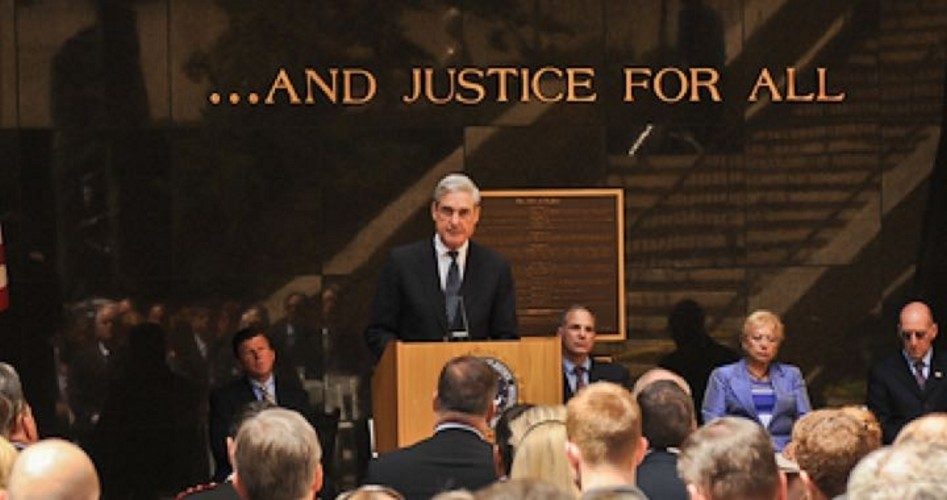
The Constitution of the United States was written to give power to a general government for the United States, but a government whose powers would be, in the words of James Madison (known as the “Father of the Constitution” for his extensive contributions to its creation) “few and defined.” As a part of that design, powers of the federal government would be divided among three logical branches — the legislative, the executive, and the judicial — and expressed as the doctrine of “separation of powers.” Each would be limited in its powers by the Constitution.
The Office of Independent Counsel is a repudiation of both the doctrine of separation of powers and the principle of limited government.
Writing for The Hill, former federal prosecutor Sidney Powell took aim at Robert Mueller (shown), who was selected as “independent counsel” (that sounds better, but is not substantially better, than “special prosecutor”) to investigate any possible “collusion” between the Russian government and members of the Trump campaign team in the 2016 presidential election.
Powell cited then-U.S. Attorney General Robert Jackson (later a member of the U.S. Supreme Court), who said in 1940, “The citizen’s safety lies in the prosecutor … who seeks truth and not victims.” Yet, since the creation of “special counsels,” what we have seen stands that wise advice on its head. These “special prosecutors” are determined to indict someone — for something — at some point.
Powell charges Mueller with being just such a prosecutor, by hiring Andrew Weissmann to lead his investigation. She stated, “Weissmann, as deputy and later director of the Enron Task Force, destroyed the venerable accounting firm of Arthur Andersen LLP and its 85,000 jobs worldwide — only to be reversed several years later by a unanimous Supreme Court.”
But, Powell asserted in her article, Weissman continued his scalp-seeking, when he “creatively criminalized a business transaction between Merrill Lynch and Enron.” Despite Weissmann’s prosecution, which Powell said “devastated the lives and families of the Merrill executives,” the Fifth Circuit Court of Appeals reversed “the mass of the case.”
Powell further quoted Jackson as saying “the most dangerous power of the prosecutor” is that “he will pick people that he thinks he should get, rather than pick cases that need to be prosecuted.”
Harvey Silverglate, a criminal defense and First Amendment lawyer, also has written an article, questioning the integrity of Mueller himself. Silverglate’s Three Felonies a Day: How the Feds Target the Innocent in 2009 explained how federal “fraud” statutes are so vague that just about any action in the daily life of a typically busy professional “might be squeezed into the elastic definition of some kind of felony.”
This is the danger in the Mueller investigation. Silverglate stated, “Mueller’s demonstrated zeal and ample resources virtually assure that indictments will come, even in the absence of actual crimes rather than behavior that is simply ‘politics as usual.’ If Mueller claims that Trump or members of his entourage committed crimes, it doesn’t mean that it’s necessarily so.”
Silverglate offers his personal experience with Mueller as evidence. “When Mueller was the acting United States Attorney in Boston, I was defense counsel in a federal criminal case.” Silverglate writes that he was contacted by a “rather odd fellow” who said he could give an affidavit to the effect that “certain real estate owned by my client was purchased with lawful currency rather than, as Mueller’s office was claiming, the proceeds of illegal drug activities.”
The “witness” told Silverglate that his affidavit was “false,” but that Silverglate’s client was “an old friend” who he wanted to “help.” As it turns out, the man was wearing a wire, and wanted to entrap Silverglate into using false testimony. This, of course, would have led to Silverglate’s being charged with suborning perjury.
This was the type of tactic of which Mueller was then capable.
These problems are examples of what concerned the late Supreme Court Justice Antonin Scalia. He saw the law which empowered a three-judge court to appoint an independent counsel as dangerous and unconstitutional. His was the lone dissent in the case involving the legality of independent counsels, losing 7-1.
Scalia viewed the independent counsel statute as a dangerous limitation on the executive power that would lead to prosecutors bringing politically motivated cases. He asked, what if the judges who were given such appointment power “are politically partisan, as judges have been known to be, and select a prosecutor antagonistic to the administration, or even to the particular individual who has been selected for this special treatment?”
“There is no remedy for that,” Scalia predicted, “not even a political one.”
Indeed, it is well known that Mueller is a good friend of former FBI Director James Comey, fired by President Trump. It is a situation that would have no doubt horrified James Madison, and it should greatly concern the American people today.



